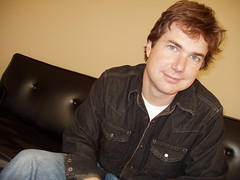
I'm writing today from Vancouver, British Colombia, where my family and I are taking a week to relax and audit a theology class from Jeremy Begbie at Regent College (one of my favorite places in the world). At the moment, I'm looking out over the city from our 22nd floor hotel room. This week hosts Vancouver's international fireworks competition, so every other night or so everyone heads out to the beaches and watches different nations compete for the best display. Does any other city in the world so effortlessly blend urban style with the majesty of ancient forests and surging, crystal rivers? I almost did my M.Div. here instead of Gordon-Conwell, but changed my mind because, among other reasons, I was afraid I'd love British Colombia too much by the time I was forced to leave the country upon graduating. My wife has never been to Regent College or Vancouver, so I'm in show-off mode. Tomorrow we'll do tea at Stanley Park, then probably rent bikes and explore the forest. I'd say this place is most like a big-city version of a Europeanized Yosemite, if that makes any sense. And watching the sun start to set (it won't fully go down until 10:00 p.m.), over the blue English Bay, wild forests rising up beyond the skyline to the north, it makes plenty of sense to me.
Strangely, I'm sitting here waiting for J.I. Packer to call me back. I never thought I'd write that sentence before today. He's (maybe) doing the foreward to a book I'm putting out next year, and thought I'd use that as my excuse to try to drop in on him at the college and introduce myself. One of the Regent staffers who nearly forced me to call him at home laughed at how Packer-fans sometimes show up and take pictures of themselves in front of his house. Check out his new book, Prayer: Finding Our Way Through Duty to Delight (co-written by Carolyn Nystrom, who groomed some of his lectures). Packer is best known for the tremendous Knowing God but has continued a steady output now into his eighties. Another classic is Evangelism and the Sovereignty of God which shows why a high view of divine sovereignty in salvation (that God chooses us before we choose him) is perfectly compatible with the practice of sharing our faith with others. Last month Packer gave a lecture here at Regent where he claimed that best the label for his career-calling would be "catechist" (agreeing with Alister McGrath's dubbing him as such in his biography of Packer). That is, he takes historic Christian orthodoxy and makes it accessible to everyone.
More on the Regent College trip later. Tomorrow, my wife and I and about six others will have tea with George Marsden, who wrote the great new (and really, the definitive) biography of Jonathan Edwards. Quite a treat, indeed. I'll write more about the Jeremby Begbie class later, but now, back to vacationing...




